#puzzle game review
Explore tagged Tumblr posts
Text


happy 2024! yearly ramble under the cut
this year I don't have many goals art-wise. I want to keep experimenting, do some more art for my friends, draw my OCs a bit more often, and maybe get a couple animations out of my head. I'll also open commissions when I'm feeling up to it. when my partner completes his degree, we'll continue work on our group project too :) Dream's End Come True has been out for almost two years now, and the love for it has not stopped, which is kind of incredible in terms of internet ephemerality. as of now it has over 100 pieces of fanart, and has been translated into five languages. thanks for reading!
2023 was a charcuterie board of about half the possible things I could have imagined happening in my early 20's, both positive and negative in equal and chaotic degree; but most importantly I met people I could not possibly imagine living without (love you all). I am not doing well, but by God I'm trying my best, and I hope the new year treats us all kindly.
here's my top-listened song this year, and a chart of a few things I liked this year as well, because it didn't fit with the formatting of the images above:
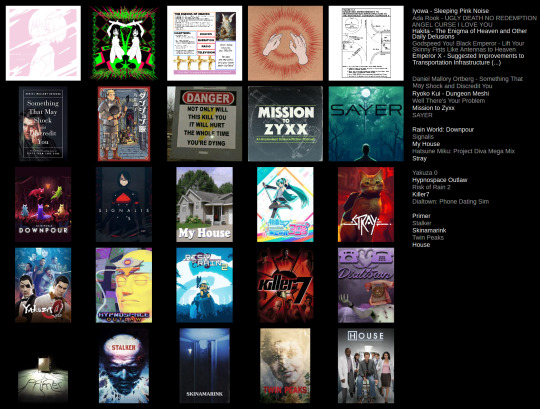
#review#sona#have a pretty nasty cold so I didn't do anything to celebrate this year. just chilling while im congested as fuck. might play a video game#go listen to the new dream puzzles album! pick up a game from the steam sale! drink responsibly!
131 notes
·
View notes
Text

Intelligent Qube
Puzzle games normally tend to be bright and cheery affairs, presenting their abstract gameplay with vivid colours and upbeat music to make the act of puzzle solving an openly welcoming and exciting time. That’s certainly not the case when it comes to Intelligent Qube, a PlayStation-era puzzler conceptualized by Masahiko Sato (a professor at the Tokyo University of Arts with a background in advertising).
Read more...
#intelligent qube#epics inc#sugar and rockets#sony#playstation#puzzle games#unique visuals#hardcore gaming 101#apollo chungus#review#video games#retro games
21 notes
·
View notes
Text
I've finally beaten Brothership, and thought I'd share some of my thoughts. End-game spoilers to follow.
First of all, if I had a nickel for every piece of media where a TV-headed guy trapped Mario in a world of his own creation to further his own selfish goals, I'd have two nickels, et cetera.
But if I had a nickel for every time the final boss of a Mario and Luigi game didn't involve Bowser in some way, I'd only have one nickel.
Reclusa was a real fun boss fight. Just the spectacle of it all, for starters. So much going on the whole way through. I like how he started talking during his attacks near the end.
He was a fun villain, too. Zokket was so dire, I was expecting whatever hatched from the egg to be, like. Some force of nature, or something. I don't know if I even expected it to talk. And then out comes this fuckin clown.
As for what else in general. The combat in this game was fun. Felt about as M&L ever does. The enemy variety and all the different attacks was super fun. The new Bros. Attacks were neat, and I liked the updates to the returning ones. The final ones keeping with the theme of escalating to be ever more over-the-top.
I love all the cute and colorful characters in this game. Them and all the different islands felt so full of personality. Specific shoutouts to the Shipshape crew, the Heatfreeze couple, and the Extension Corps. All very fun characters that I could spend far longer typing about.
And, uh, speaking of spending far longer, wow, I thought the game was just about to end like three times and it just kept going. It's like. So we're fighting Zokket and then the spicy egg, right? Nope, Bowser. We got through the barrier and are fighting Zokket, we're just about done, right? Nope, Reclusa made a tree. We're about to fight Reclusa, right? NOPE, lotus eater flower world. Note that I'm not complaining about the game's length; I just think it's funny.
Feels like this is as good a point to end as any. This game was great; solid 8, maybe even 9. Take easy.
#mario and luigi#brothership#mario and luigi brothership#mario and luigi brothership spoilers#brothership spoilers#video games#final thoughts#review?#long post#long post under cut#venn diagram with reclusa between jevil and mr. puzzles
7 notes
·
View notes
Text

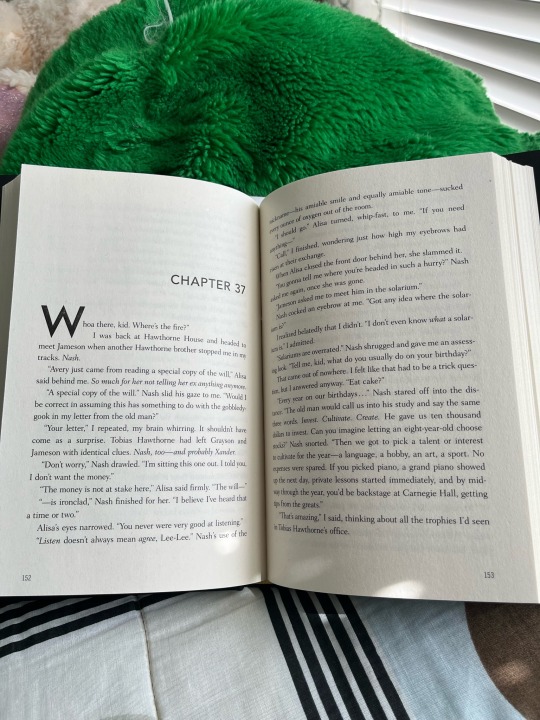
I’d learned this much playing chess: The more complicated a person’s strategy seemed, the less likely an opponent was to look for simple answers.
#reading#books read in 2024#bookblr#books#book photography#book blog#bibliophile#books reading#books and reading#the inheritance games#jennifer lynn barnes#inheritance games#avery grambs#jameson hawthorne#grayson hawthorne#xander hawthorne#nash hawthorne#averyjameson#averygrayson#knives out#puzzles#riddles#games#ya mystery#mystery thriller#this was so much fun#i loved this#review#five stars#march reads
24 notes
·
View notes
Text
2023 Game Of The Year: Storyteller (plus DLC)
I played Storyteller after the DLC came out, and Storyteller (with the DLC) became my game of the year.
Unfortunately, I can't really explain why without spoiling some puzzles. I will not try not to spoil any solutions in the screenshots (except one), but I will have to spoil the game mechanics.
What is Storyteller
Storyteller is a game where you arrange comic book panels and characters to tell a story based on a prompt. It doesn't require any dexterity, only deduction. You drag and drop comic book panels into slots, drag and drop character into panels to arrange them, or drag populated panels and characters around.
The challenge is to understand how the characters and panels work, what the prompt wants you to do, and how to do that. Early on, the game is mostly about figuring out the rules governing the characters and panels. It slowly shifts towards more "thinky" problems, where the challenge lies not in understanding how the game works, or what the goal is, but how to fit the required story beats into a limited number of panels.
Depending on the outcome of a panel, you may see little icons, speech bubbles, or thought bubbles that describe whether an action failed or succeeded, and how the characters think or feel about that. Sometimes the outcome of a panel is communicated in a much more direct way, and acted out by the characters.
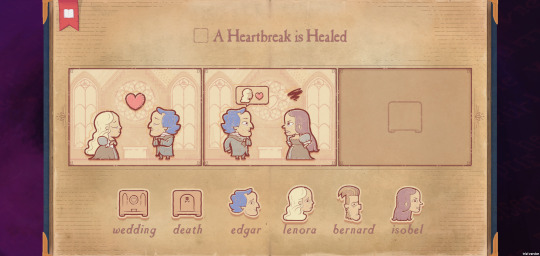
Screenshot from second chapter puzzle "A Heartbreak is Healed"

Screenshot from first chapter puzzle "Heartbreak with a Happy Ending": At this point you are still learning the game mechanics like placing panels and characters
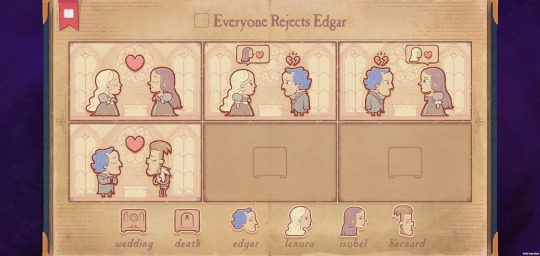
Screenshot from "Everyone Rejects Edgar": More thinky puzzle than recreation of a storytelling cliché, and an opportunity to apply what you know. The characters except for Edgar are interchangeable. You can have them fall in love with any other, or reject Edgar in any order.

Screenshot from later puzzle "Everyone Sits on the Throne": A thinky puzzle in the same vein as "Everyone Rejects Edgar". This time, there are important differences between the initial states of characters. You cannot make them sit on the throne in any order.
The panels can be thought of as story beats, sometimes as scenes/places, as in "A and B meet in the kitchen", and sometimes as actions/verbs, as in "A and B kiss". They aren't verbs in the sense that you can just put Alice and Bob in the kissing panel and they always kiss. They only kiss if they love each other, or at least if they don't hate each other. All you can do with the characters as the player is to put them in situations. You can drag the "horse" character into the "watering hole" panel, but you can't make it drink. I mean, probably you could, you might, but would be the puzzle.

Screenshot from "Hatey Murders Father and Marries Mother": It's obviously an Oedipus reference. You see that Hatey doesn't want to murder his father or marry his mother in this constellation.
The game keeps track of the relationships between characters, beliefs of characters, and states of objects. That means (I made this example up in order to not spoil any puzzles) if Alice has been in the kitchen with the cookies, Alice believes there are cookies in the kitchen. If the Cookie Monster has been in the kitchen, there are no more cookies in the kitchen. Now Alice could tell Bob that there are cookies in the kitchen, and Bob could ge hungry and blame Alice for lying, or he could catch the Cookie Monster eating the last cookie. The possibilities for drama are there.
Characters have different initial states and motivations. For instance, the King and the Queen are initially married, and they both have the crown.

Screenshot from "Three Heads Roll": Only the Baron wants to kidnap the king.
If you're into that kind of thing, you can imagine Storyteller as a STRIPS-like planning system with a known or at least discoverable initial state, multiple goals (not just one goal state), panels as actions that take characters as parameters, and a lot of state that can be observed and deduced, but not directly manipulated.
If you're not, you can just play Storyteller as a game about telling stories based on a prompt.
Progression
After you start a new save file, the whole game is open to you. Puzzles or stories are grouped into chapters of four of five stories. Each chapter has a common theme, and a set of common characters and panels. Later chapters mix it up a bit, and introduce characters into different environments or combine characters from multiple stories or mythologies, whereas earlier chapters mostly introduce panels and characters so you can learn how they operate.
Like I said, the whole game is open to you from the start, so you are free to skip a puzzle if you are stuck, to revisit an older chapter, or to skip to the last chapter. It doesn't really matter, because you have to solve every puzzle in the game in order to get to the end.
The first chapter teaches the mechanics of dragging and dropping panels, dragging and dropping characters into panels, and dragging populated panels around to swap them. Then the next couple of chapters introduce different characters and settings. Usually the first story of a chapter only has a few new characters and panels with a rather obvious prompt, the second introduces more content and a slight variation, and the third and fourth have a slight twist.
The later chapters are more focused on actual puzzles.
Some puzzles have multiple solutions, and after solving it one way, you see two additional prompts. For example, the princess could kiss the frog and then the frog turns into a prince, or the princess could kiss the frog but the frog turns into another princess.
I skipped many of those variations on my first playthrough, and this way I blazed through about 40 puzzles without ever stopping and thinking or feeling overly challenged. I learned how most of the characters and panels work, and then I went back to solve all the variant prompts. Somebody I know played every level in order and solved the variant prompts right away. That makes for a more thinky experience earlier on. Either way works, and both are clearly intentionally permitted by the game design.
In the final chapters, Storyteller actually becomes thinky and difficult. This seems like a flaw in pacing, but it works out to the first 70% of the puzzles taking 30% of the time playing it, and the last 30% taking 70% of the time. Instead of treating Storyteller like a storytelling game, you must finally treat it like a puzzle game.
When you beat the base game, the DLC content is added. Levels in the previous chapters get an additional variant prompt, and a new character is introduced. This character acts completely different from all the previous characters, so you have to at first understand how it interacts with the panels from the base game. The variant prompts are harder than anything in the base game. For puzzle game aficionados, this is where it gets challenging for the first time. Here's a "metagaming" tip: None of the DLC variant prompts is solvable with the characters from the base game. Therefore your solution must incorporate the DLC, and it would be impossible to reproduce with base game content.

Screenshot from "Eve Dies Heartbroken Devil makes everyone miserable": You have to experiemnt to figure out how the devil interacts with the panels and characters.
Why It Works So Well
Storyteller is a bit on the easy side. So why does it work so well?
If you are an expert at puzzle games such as The Golem or Stephen's Sausage Roll, then maybe it won't work for you. But if you are looking for a puzzle game that is different, if you liked Splice or Cogs, then Storyteller could be the game for you. It's not a puzzle platformer, not a first person puzzle adventure like Obduction or Sensorium or Quern.
Storyteller is not a storytelling game in the vein of Facade, but it uses themes and literary allusion to keep you interested early on. The music sometimes feels more like a fun Easter egg, but never annoying.
Early prompts in the vein of "boy meets girl" soon turn into more complicated prompts, requiring some minimal lateral thinking to figure out what you need to do. Some of the prompts are literary or mythological allusions and references. That keeps levels interesting and varied even when the actual puzzle part is simple.


Screenshot from "Butler Gets Fired" and "Friedrich Takes Revenge": The puzzle part is quite easy, and there is little lateral thinking involved. The fun is mostly in re-enacting pop culture tropes.

Screenshot from the level selection: Every puzzle in every chapter is open from the start, but it's probably best to do them in order.
Many bad puzzle games get this wrong. You can never really solve a puzzle, because there is only one thing to do. You pick up a key, you open a lock, you see a button, you press it to open a door, you just do the next thing you can do over and over. Instead of puzzling, you just push every button and see what changes to know where to go next. It's fine if the puzzle mechanics are just an excuse to get the player to traverse a temple/dungeon back and forth, if you see the lock and the key and the puzzle mechanics are just there for flavour and motivation. It's no okay if your game is not an action adventure or a puzzle platformer, but an actual puzzle game.
Monument Valley is such a game that doesn't have any actual puzzles in it, you just walk from one place to the next. The game is carried by the interesting visuals and the novelty of the perspective mechanic. (If you are looking for something like Monument Valley but challenging, I could perhaps recommend Naya's Quest or Selene's Labyrinth.)
Early on, Storyteller has this flow of simple and easy puzzles (like Monument Valley), one solved after the other, and it gradually gets more difficult. The references to books and storytelling clichés aren't particularly deep or laugh-out-loud funny, but they make for the occasional chuckle. Sometimes part of the solution process is to realise that "boy meets girl" was last time, and this time you have to use "girl meets girl" to make the story fit the prompt with the characters you have at your disposal.

The variant prompts manage to side-step a problem I that stood out to me on my playthrough of Baba is You, and a problem I encountered designing my own puzzles. Sometimes there are two levels in a row, where one level has an "unintended" solution, and the next has the "intended" solution removed, so you have to find the second solution for the first level. If you manage to find the "unintended" solution the first time, the next level will be very confusing. Just this solution again? Wait, what was the other solution? Did the last level try to teach me something I missed? Should I go back again to find the other solution?
It was confusing to me anyway, a couple of times when I played Baba is You. The same idea is implemented in Storyteller in a much better way. Instead of having a modified copy of the same level right afterwards, Storyteller categorises solutions into "basic solution", "variant A" and "variant B". Even if you manage to find one variant with your first solution attempt, you immediately see both variant prompts, and there is always one more variant to try next. You never have to construct the same solution twice in a row. Sadly this elegant system cannot be applied to Baba is You.
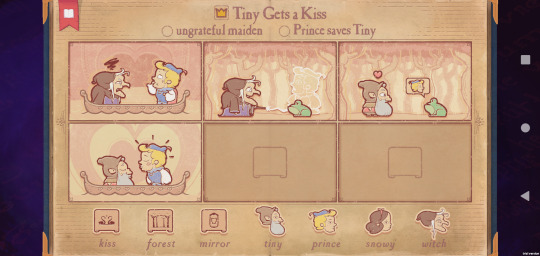
Screenshot from "Tiny gets a kiss": Sorry for spoiling the solution. Even if you manage to have the prince save Tiny the first time around, you would still have to find a solution where Snowy is ungrateful, and Tiny gets a kiss.
Pre-History
I can't really talk about Storyteller without explaining why I was drawn to this game in the first place. I first heard about it in 2008, when it won the IGF. Back then it was more of a story sandbox in the vein of "Tale-Spin". That's the old story generation AI that produced the sentence "gravity drowned", if that means anything to you.

Screenshot: Storyteller prototype with old pixel art
About a hundred flash portals mirrored the initial Storyteller Flash prototype that won the IGF. The original is still here on Kongregate.
Back then, I wondered how a sand box such as storyteller could be turned into an actual game. It was a prototype and some mechanics, but not really a game. It looks like the developer wondered, too.
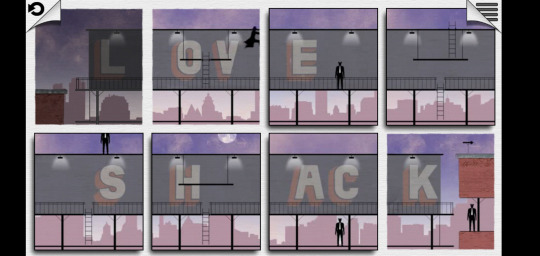
In the mean time, FRAMED had came out. Now FRAMED looks clearly inspired by Storyteller, because it also has a mechanic where you rearrange panels, but it's nothing like it. FRAMED is more like the Limbo to Storyteller's Braid. Ironically, FRAMED is "a game that tells you a story". Storyteller is an actual puzzle game.
It has been in development longer than Duke Nukem Forever, but even after all these years, Storyteller doesn't feel dated or superfluous. They finally found a winning formula.
Storyteller was developed by Daniel Benmergui and published by Annapurna Interactive. Get it on Steam here, or if you have a Netflix subscription and an iOS or Android device, the price of the mobile app is included in your monthly Netflix fee. Storyteller is also available for the Nintendo Switch. I would recommend playing it on a PC or tablet.

27 notes
·
View notes
Text
Hey you! Do you like puzzle games with dark humor and cute art styles? Do you want to go around an office building cleaning up progressively more insane messes? Do you want to be a werewolf janitor? Then i recommend The Werecleaner. I just finished it today, and it's absolutely lovely. A wonderful sense of humor, decent challenge, an adorable artstyle that made me smile, and a genuinely super fun time! and the best part? IT'S COMPLETELY FREE! Go grab it now and show these indie devs some love!
#indie games#game recommendations#game review#puzzle games#dark humor#comedy#video games#video game recommendations#pc games#gaming#indie dev
16 notes
·
View notes
Text
HOLY. FUCKING. HELL.
So Specialedd finished his gameplay series of In Sound Mind and is, hands down, easily able to tear the fuck me out. This game is a masterpiece, its so emotional. I really cried at the fact that the government or smth tried to kill Desmond and his parting with his cat. This game easily made me tear up, wtf. (This is actually a rare occurrence for me 😭)
This is a fucking masterpiece psychological game. It had the strongest feels and--ugh its just way too emotional. It tackled things about mental health whilst being a game.
The characters that resonated the most to me is Allen and Desmond. My favorite part of the game would be Jorge (a mannequin)-and also the other mannequins-helping Desmond. Fuck. And it has an animated mv of it which made it sooooo sick!! It's way too fucking awesome. And that scene in the post-credits? Fucking wtf moment for me! The kinda 'relieved' type of wtf lol.
I should also mention that in Lucas' tape, those star connecting puzzles are so fucking awesome. And also i remembered, the 4 medallions in the church, fucking awesome detail.
I love this game and I--ugh damnit.
This is way too realistic for me. Damn too much. Im gonna have a brainrot on this. And the lamp/small chandelier near the staircase, the light had the colors! And the details of the map outside the building--the rooftop. All the places-Homamart, Icarus point, the quarry and the Elysium state park(or whatever, its smth Elysium) theyre all there! I love that detail sm. I even stopped the assignment im currently doing just to check on yt and suddenly the last episode of the gameplay is the first thing i saw! XD
I love this. I so love this sm. This-well, ive had a bit of interest in psychology or smth that affects people's behaviors and minds and stuff. This game. This. Game. Damn showed it too well.
In sound mind is going to my favorite games, kudos to We Create Stuff !(game dev team) This game has left an impact on me.
#siren screams#in sound mind#psychological horror#games#horror game#game review#yea i didnt play it XDDDD#but tho this game is a bit too scary for me to play and its so beautifully crafted#a mix of psychology. action. monsters. horror and puzzles#medusa#icarus#minotaur#cyclops#damn this game hit me hard#this game is so underrated and thats when u can see a very good game XD#osjsbdnndndndnnddd in sound mind brainrot XDDDDDD#oof i should get back to my homework lol byeeeeee#maybe I'll tag the characters too#allen shore#max nygaard#virginia ruhl#lucas cole#desmond wales#agent rainbow#tonia#the cat#rosemary james
29 notes
·
View notes
Text
REVIEW: Inscryption – Daniel Mullins Games
Release Date: 19th October 2021 Available On: PC, PS4, PS5, Nintendo Switch, Xbox One, Xbox Series X/S Genre: Indie Game, Card Battler, Rogue-Like, Card Game, Story Rich, Puzzle, Horror
Review Length: Short (~600 words)
Review Spoilers: Minor
---------------------------------
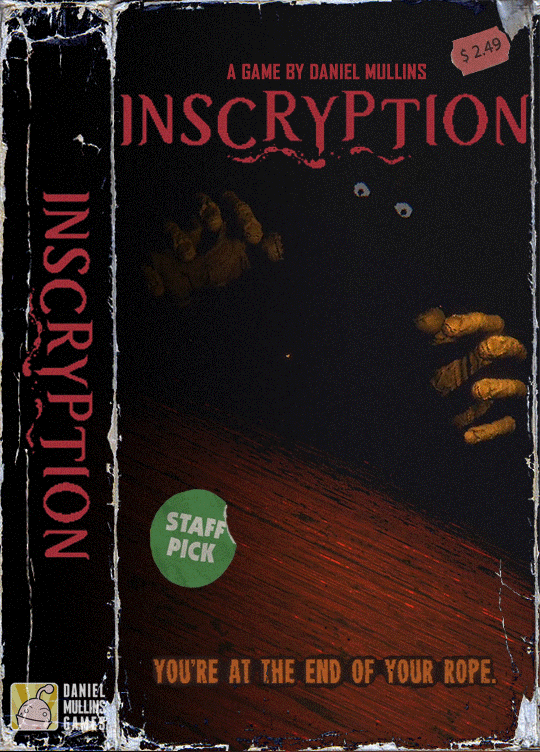
Gameplay
Inscryption is an Indie horror, rouge-like, card-battling game. If you want to draw similarities with card-battle games, think of Yu-Gi-Oh or Pokémon cards, but a more simplified version that still requires some strategies. But with all the ways you could possibly play, you’d be sure to find your own cheesed style. Personally, I am not the best at strategy-based games or card games, the hardest card-battle game I’ve played was Club Penguins Card-Jitsu back in the day, but I found Inscrytion to be fun and immersive, even if a little frustrating at the start.
The game is played in ‘Acts’. Act One would possibly bring the most frustration to an average gamer or someone who just isn’t familiar with strategy card games, and as I am both; I was frustrated at the beginning. But, once you’ve ‘failed’ a few times in the first Act and find yourself falling into the game challenge more and more, it can become fun, and you can start to pay attention to the details that the game you and the game will slowly become easier as you gain insight into the fights and bosses presented to you.
The game is filled with puzzles, most are not necessary to the game, but it may help you have better cards to play with or unlock more of the lore of the game.
Once you’ve completed the game for the first time, you unlock challenges that can make gameplay more difficult, if that’s your masochistic jazz.
Story
As to not give away too many details as this is a story-dependent game that should be unspoiled for the average gamer.
At the start, you’re unsure of who you are and just assume you’re playing a blank-slated husk character that represents yourself, which is later proven different. You’re placed in a darkness-encased environment with a strange character that introduces you to their card game in an almost Dungeons & Dragons Games Master manner. The attitude this darkness-encased character has is kept throughout this Act. Once you’re allowed to explore your environment a little, you’re allowed to really intake your enclosure and partake in the puzzles it presents you.
The story is well put together, enraptures, and lets the player piece the story themselves without it being spoon-fed to them. As the game continues into its further Acts, you feel an “Oh woah what” sensation as you start to piece the story together with the snippets you gain access to.
You can unlock more background lore details to the story of the game in the later Acts, but it isn’t necessary to fulfill your average gameplay experience but might be fun to unlock in further playthroughs or if you want to have in-game downtime to explore.
I love both major and minor characters that are introduced to you as you play. They all keep the story heavy-duty glued together nicely. The characters all mesh and conflict with each other well. It’s a joy to watch their interactions with each other and the player, especially once the twists and turns start.
Art Style/Music
Inscryption is beautifully put together. The art style throughout the game changes dramatically, but it does not cause any conflicts to the player's gameplay experience as the Acts progress. I personally LOVE most of the art styles that present themselves in this game.
The music in Inscryption is beautiful to listen to and even have their own little easter eggs if you listen to them closely enough. Act 1, I believe, has the best themes for it environment and bosses, but Act 2 also have great themes also. Some of the tunes might be a bit jarring to listen to at the beginning with their sharp tones and rumbling bases. But once you really get into the vibes and understanding of characters in the game, they’re amazing to engross yourself into the world of inscryption and uncover its story.
[minor spoilers from tune theme names below]
My top songs from the Inscryption OST would be:
1. The Trapper
2. The Scrybe of Magicks
3. The Four Scrybes
4. Deathcard Cabin
The whole of the Inscryption OST is available on Spotify.
Final Comments
I honestly enjoyed Inscryption, especially once I really started to understand and get into the gameplay and story. The story and art styles are the real cream of this crop and really bring the story together.
I highly recommend this game to an average gamer or if you want to try out a card-battling/rogue-like game for the first time.
Cheers,
The Average Gamer ---------------------------------
If you want to chat or get Spoiler-esque game insights, feel free to PM me!
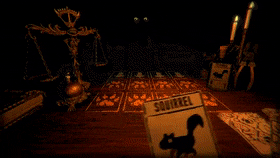
#Inscryption#daniel mullins games#Indie Game#Card Battler#Rogue-Like#Card Game#Story Rich#Puzzle#Horror#PC#PS4#PS5#Nintendo Switch#Xbox One#Xbox Series X/S#TheAverageGamer#TooAverageOfAGamer#Gaming#Reviews#Blog#Reviewing#Gamer#Average#blogging#blogger#GameReviews#GamingCommunity#GameOpinions#GamerLife#VideoGameReviews
32 notes
·
View notes
Text
Jameson Hawthorne









#aesthetic#games#games untold#glorious rivals#the inheritance games#jameson hawthorne#avery kylie grambs#averyjameson#the hawthorne legacy#the final gambit#the brothers hawthorne#the grandest game#riddles#puzzle#jennifer lynn barnes#book review#books
17 notes
·
View notes
Text

Hi everyone! I would like to ask for your support in posting a review of my latest puzzle word book, which will help you improve your vocabulary and boost your memory skills. It’s especially beneficial for people experiencing dementia. The book is available in Kindle version and is free to download. Get yours now! This promotion will only last until August 12.Here's the link for you to checkout and its a buy free available in all amazon. https://www.amazon.com/dp/B0DCBYJMCJ
#FREE DOWNLOAD
#FREE BUY KINDLE VERSION
#EBOOK
#BOOKS #Puzzle word lover
#puzzle word search
#free
#book fanatic
#authors#book review#book blog#books#bookworm#bookish#artwork#free ebooks#kindle ebooks#kindle unlimited#puzzle games#puzzle#mr puzzles
7 notes
·
View notes
Text
If you enjoyed any of the tags below and love puzzles, go wishlist Blue Prince on Steam! I'm playing the demo right now and it's addicting and beautiful 😍
[tags: myst/riven, gravity falls, knives out, over the garden wall, quern, the westing game, clue/cluedo]
#myst#gravity falls#knives out#over the garden wall#the westing game#cluedo#riven#charade 1963#quern#game recommendations#game release#puzzle games#otgw#game review#blue prince
6 notes
·
View notes
Text
Please for the love of god tell me I'm not the only person out there who thinks tears of the kingdom kinda fucking sucks
#i wanted to love it so bad but its made me cry from frustration more than any game ever has#LIKE. IT CANT JUST BE ME#BUT I LITERALLY CANT FIND A SINGLE NEGATIVE REVIEW OR EVEN BASIC CRITIQUE????#girl help. i loved botw. i will never play totk again#randy rambles#not even done with it either. 3/4 regional phenomena done. half the memories.#does the story make up for it. does the story make up for the fact that i spent 2 hours in the worlds worst puzzle
10 notes
·
View notes
Text

I.Q Final / Kurushi Final
Nearly two years after the first game’s release, an expanded version was released in Japan and Europe simply known as I.Q Final (or Kurushi Final: Mental Blocks, for our European readers). At first glance, it’s largely the same as before, but there’s a few things changed and added that make for an arguably better experience.
Read more...
#i.q final#kurushi final#intelligent qube#sugar & rockets#sony#playstation#puzzle games#unique visuals#hardcore gaming 101#apollo chungus#review#video games#retro games
16 notes
·
View notes
Text
Okay, now that I've had time to get my bearings and sit with Another Code and really think about what I want to say about it, I am prepared to do so.
First off, the Switch remake is not Trace Memory. In fact, if you were like me and played Trace Memory as a kid but then it kind of fell off your radar and you didn't buy a used copy on eBay to replay it before you replayed the remake, you would be forgiven if you had a little niggling feeling that you couldn't place that you had seen all of this somewhere before, but not where. Ashley's name isn't even the same - Robbins is spelled with only one b, which I do understand is the same as in the original UK version, but was still quite jarring to someone who's only played the US version.
I didn't feel like I was playing the same game. There's not a single puzzle that I remember as being the game, and where the original made use of it's hardware, so too does this game, having puzzles that depend on the gyroscope, which might be frustrating if you're playing in docked mode and the controller you tend to use doesn't have gyroscope controls.
It is certainly more fleshed out. There are more parts of the map that you get to visit, and you learn more about the Edwards family, though it also felt like it unraveled more threads than it was willing to wrap up, which is peculiar because it also got rid of one of the most interesting aspects of the original game, which is the multiple endings. No matter what you do, the game funnels you into the "good" ending, which I won't say more details about, just in case anyone reading this hasn't played it. This is a little annoying, because it feels like it's taking away one of the things about the game that made it so special, that the choices you make ultimately matter, but is also overshadowed by the fact that I suck at this game and always have, so I never got the good ending on my own, so now knowing why what happened had to happen and how things ended up the way they did... it's nice to have the closure I was never skilled enough to achieve on my own.
Another cool aspect of this game is that Sayoko being Japanese is not incidental - they actually spend time explaining various aspects of Japanese culture, instead of DTS cards Richard's diary is left on origami cranes, and there's a sweet moment where they talk about the meaning of the name Mizuki. As well, there's actually more depth given to Sayoko's character, even though she was still fridged.
So ultimately... Is it a faithful 1:1 recreation of the source material? No. In fact, you might feel frustrated because it feels like the game is treating you with kid gloves - from things like the forced good ending to the fact that anytime you're working on a puzzle, you just have to press a button to get hints and if you go through all of them it basically just tells you the answer straight out - which, in all fairness, it is.
But is it still worth playing? Yes. It's still a good game, even with the oversexualization of Ashley and the fact that with the camera, you spend most of the game looking directly at her ass and she's 13 years old. If you like puzzle games, which if you don't why are you even following me, it's definitely a worthy entry into that catalogue, which does seem to have been drying up lately.
Now, do I want them to make a remake of Hotel Dusk in the same style?
Hell fucking no. The game was good, but not "I trust you with my baby" good.
#another code#another code recollection#trace memory#game review#like i do think that there's a lot of things that make me feel like this was just a test run for a hotel dusk remake#because otherwise it makes no sense to pluck out the less famous sister and leave the objectively better known one in the vault#and like the fact that the puzzle solved noise is the same as hotel dusk#and the loading animation/going into a puzzle animation is sketchbook style#but hotel dusk owns a part of my heart that trace memory never did#and especially after replaying it and confirming that it is just as good as i remember#remaking it and keeping the magic would be impossible to do with the same kids gloves AC had would be damn near impossible#like they could do cool stuff with voice acting#which AC has but wasn't in the original#but it's a very delicate balance when you're dealing with a story where the main character straight up shot his best friend#and there's a part where if you're not good enough at the game you just. die.#you literally can die in hotel dusk.#but all that said#i'm doing ECT again so my memory is really bad#so i'm waiting until it comes back to play the sequel#but i am excited and looking forward to it!#queue takumi defense squad
9 notes
·
View notes
Text
So I just finished a new game I was trying and I am honestly super in love with it. The game isn't too long (it took me like 3 days to beat it) but Chants of Sennaar is, to me, the perfect puzzle game.
Chants of Sennaar is a language-based puzzle game. You, a foreigner, arrive at a tower full of disconnected peoples. It's your job to learn all their languages, their structures, and how to connect them. It's visually stunning, with bright colors and strange environments, all the floors are drastically different, and the end game really impressed me in how it was designed.
The puzzles (mainly just trying to understand the language) are straightforward and all the answers are available - you just have to find and interpret them. Greetings are the easiest and difficultly of language increases with each floor.
Genuinely, I adored this game. I never felt like I needed to look up any solutions, but I never felt the task was too easy either. The styles towards the end were some of my favorites as they dealt with technology and science themes. The game is easy to pick up and put down again, and sometimes it helped to walk away from a puzzle to come back with fresh eyes. I genuinely wish this much time and care and love (you can really FEEL the love in this game) was put into more puzzle-centric games, where solving a puzzle feels like a rewarding effort. I kept gushing to my partner over how much joy I got from solving a language, or even just a word I've been stuck on.
Anyways 10/10 puzzle game, it's on the Switch and Steam (probably elsewhere too?) and I highly recommend it if you like a good puzzle.
#puzzle games#chants of sennaar#game review#talking#i dont really do game reviews usually but FUCK this game was so good#it was genuinely such an engaging experience and i got lost in it wholeheartedly#i LOVED just throwing on a video and playing and just forgetting where i was irl#wonderful fantastic showstopping
16 notes
·
View notes
Text
how people survived the original god of war for the ps2 without getting pissed off at the shitty and mean-spirited level design is beyond me.
#someone is probably going to scream at me to 'get my shit together with the game noob!'#i have issues with the concept of 'get good' because its a lie in of itself.#shallow rambles#i will NOT understand how this game got glowing reviews. genuinely. how can you overlook the puzzles that kill you the moment you make one#tiny mistake. or enemy types punishing you for mistiming buttons for quick time events....#oh yeah there are quick time events.... bloody hell.#anyways i wish 2005's god of war's level designer sleeps with their pillow full of lego pieces#shallow is yelling about game design again#i'm at the pandora temple (specifically posiedon's challenge... which... i have a LOT of thoughts about).
6 notes
·
View notes